
Slop WorldMar 19
pirate wires #136 // paid influencers, foreign bot armies, and a biblical flood of AI-generated content — how much of our internet is real? and is there any way to save ourselves from slop?
Sep 9, 2025

In a post that went viral on X earlier this month, a man named Tommi Pedruzzi claims to have made $3 million selling books on Amazon — without writing a word. (The post was recently community-noted.)

His first piece of advice for entrepreneurs wanting to build ebook businesses? “Stop writing interesting books.”
Predictably, people thought Pedruzzi was a tool.
Ben Sixsmith, an editor at The Critic, captured the general response: “I’m 34. I sold my soul to Satan. But I wish someone had told me this brutal truth from the beginning. 1/ Stop trying to be a human being.”
(In a more recent post, he writes: “The dumber you write, the richer you get.”)
Pedruzzi’s online persona feels familiar and aspirational: viral threads explaining how to build a million-dollar business using AI; a 50k+ following on X; a girlfriend he claims is a Brazilian model; verdant backdrops featuring palm trees (I’d later find out he often travels to Bali). He has model-good looks and promises that you, too, can make “seven figures” generating and selling e-books, if you only listen to his advice and sign up for his course.
Intrigued, I decided to investigate what this guy actually does. I expected to find someone making everything up just to sell a course — and while I found evidence suggesting that’s partly true, I also discovered a semi-legitimate, if ethically questionable, business model.
Pedruzzi’s approach is smart. He uses AI to analyze best-selling books on Amazon, identifies common complaints in the reviews, then publishes “improved” versions under pseudonyms addressing those specific pain points. He also sells a course teaching others to replicate this process.
While he’s not creating wholly original content — most of his books are AI-generated slop — he has found a way to exploit gaps in the market and occasionally delivers value to customers, however inconsistent. He represents the unglamorous reality of the creator economy: not the aspirational influencers with brand deals and free trips, but the small operators mixing legitimate business tactics with ethically dubious shortcuts, usually with a course attached.
It is a scam, but not entirely.
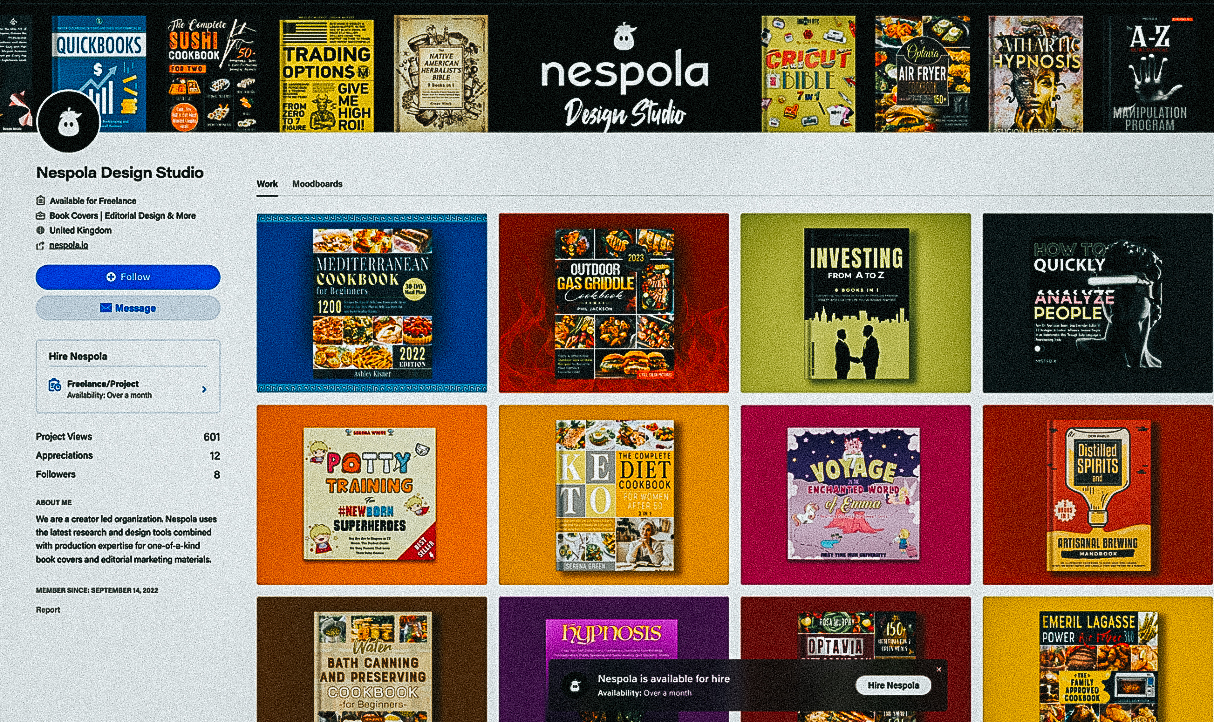
Pedruzzi trips alarm bells for people because he’s cagey about his book titles — besides throwing around figures like $3 million in revenue, this is the thing that makes people think he’s just another scammer. He refuses to mention them on social media, and he wouldn’t tell me, either.
During our initial Zoom call, Pedruzzi told me it would be easier for him to send me a portfolio of his book covers, as opposed to links to individual books so I could get a feel for the type of work he published. He later direct messaged me a link to public-facing graphic design portfolio on Behance featuring cookbook and how-to book covers. When I later asked him to confirm those were his books and not graphic design portfolio, he backtracked, claiming they were “clients,” but not his books. But given that they fit the description of his business — I’m assuming they are, otherwise why would he have shown them to me?
I cross-referenced the pseudonyms from the portfolio with Amazon listings and matching cover designs. Here’s one example: Time-Saving Potty Training by “Serena White.” It reads like GPT-2 tier slop, and it’s loosely based on the most popular (non-slop) book about potty training (Potty Training in Three Days by Brandi Bucks). Bucks, however, has received recurring negative reviews claiming the book ignores pooping (key to potty training, many are saying); Pedruzzi’s book, in response, features a section on constipation to meet market demand.
Another book from the Behance page, The Handbook of Herbal Tinctures, starts: “However, the common understanding is that tinctures are created by immersing cannabis or other similar plants in a highly concentrated alcohol solution...”
I’m sure that’s true, but it’s a nonsensical first sentence for a book.

Most of the books I was able to track down sell poorly and receive negative (or mixed, at best) reviews. A series of books by “Eric Mallon” on how to use ChatGPT enjoy some praise (“straight forward,” “a must have”), but elsewhere, people call them boring drivel.
All this to say, these aren’t exactly best sellers and easy passive income. These books are likely selling a few copies a month, if any.
That’s probably why, with one early exception, Pedruzzi never, as far as I can tell, publishes under his own name. Instead, he creates SEO-optimized pseudonyms, copying the names of real people with enough online presence to seem legitimate after a quick Google search. “Eric Mallon” shares a name with the CTO of Qloud Games. “Ashley Kisner,” the name used for a cookbook, shares a name with a YouTuber who at one point published dieting content.
Pedruzzi uses the same strategy to optimize his book titles. His Insecure in Love has a similar title to a bestseller by a licensed psychologist. This might explain why he’s so weird about revealing his titles, advising students in his course: “DO NOT SHARE BOOK TITLES. To respect the privacy of your business, we urge you not to share your titles or keywords in use.”
Little touches like these are ethically dubious, but they are clever.
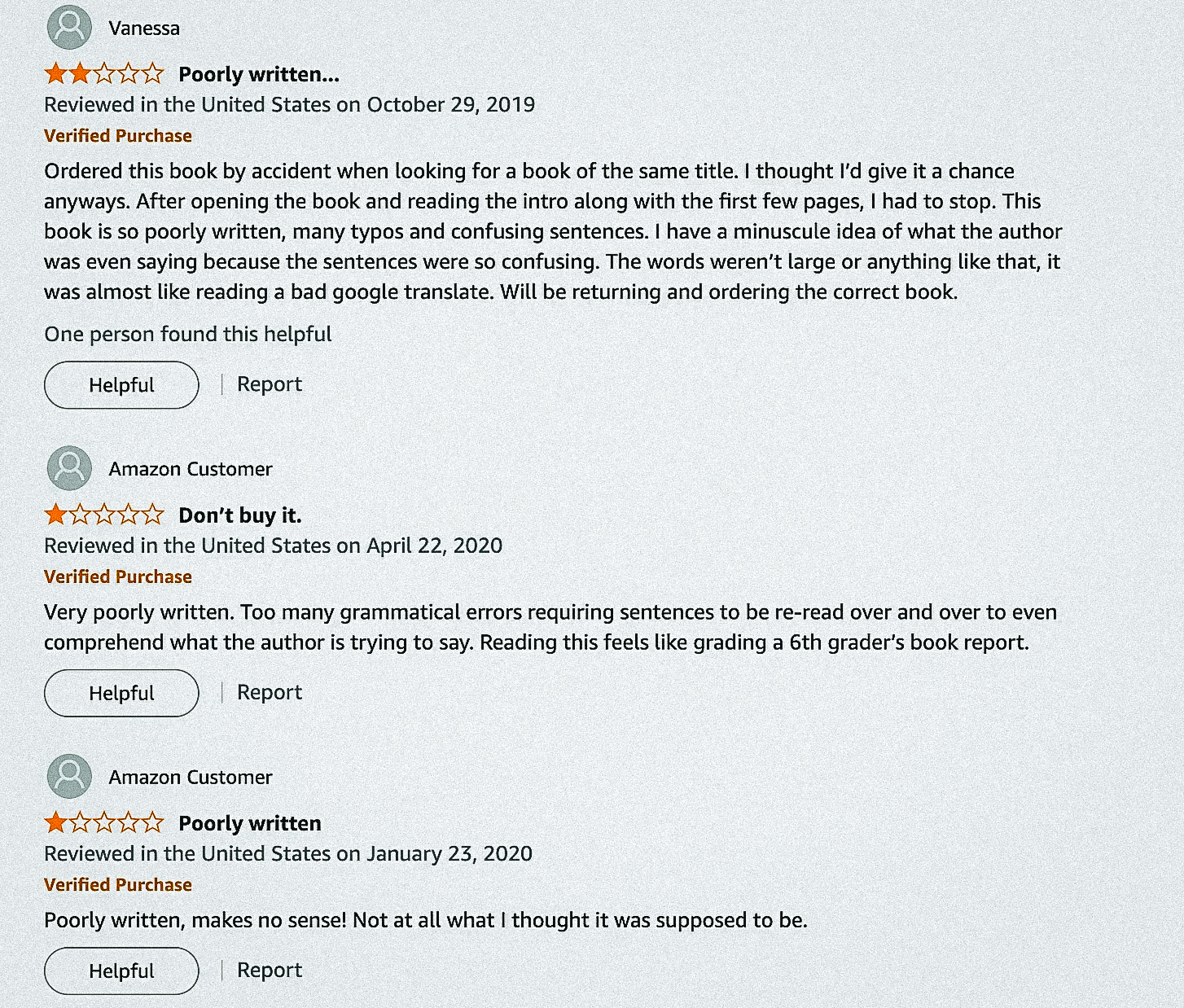
After weeks of pressing Pedruzzi for proof of his $3m claim, he finally admitted “$3 million” wasn’t annual income but cumulative revenue since 2019. His actual yearly revenue was to $1.2 million, with a “substantial part” from his $99/month course, PublishingOS, which teaches other people how to create their own e-book empires.
And, like everything Pedruzzi touches, this course hovers at about 40 percent legitimate, never quite crossing into outright scam but never feeling honest either.
The testimonials check out, but if you dig into the specifics of who’s in the community, and that’s where things get weird. In just the few weeks I was reporting this piece, membership dropped from 304 to 273 — poor retention for a product supposedly teaching people to make thousands monthly. At $99/month, even peak membership only generates about $360,000 yearly before churn, and the churn appears significant.
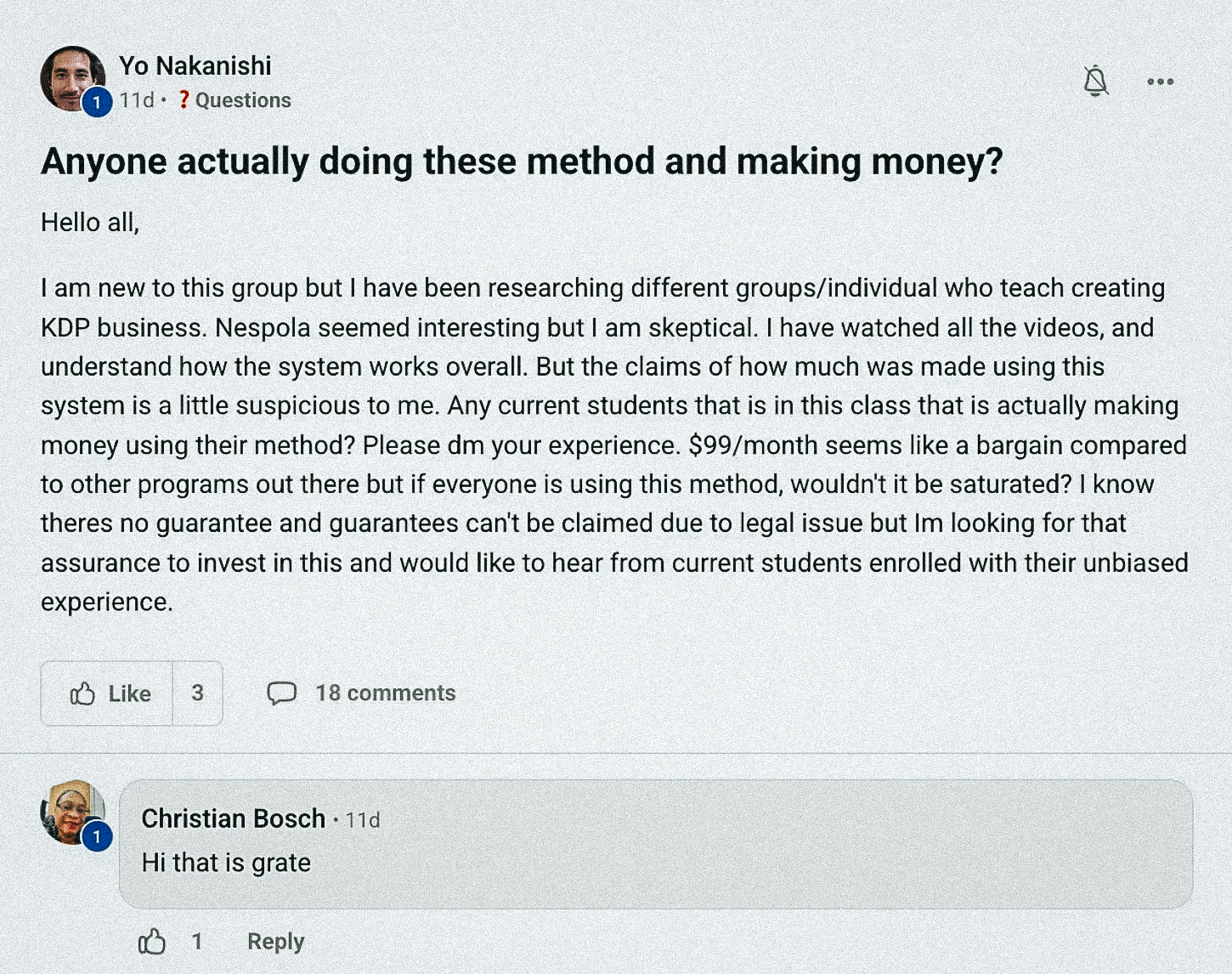
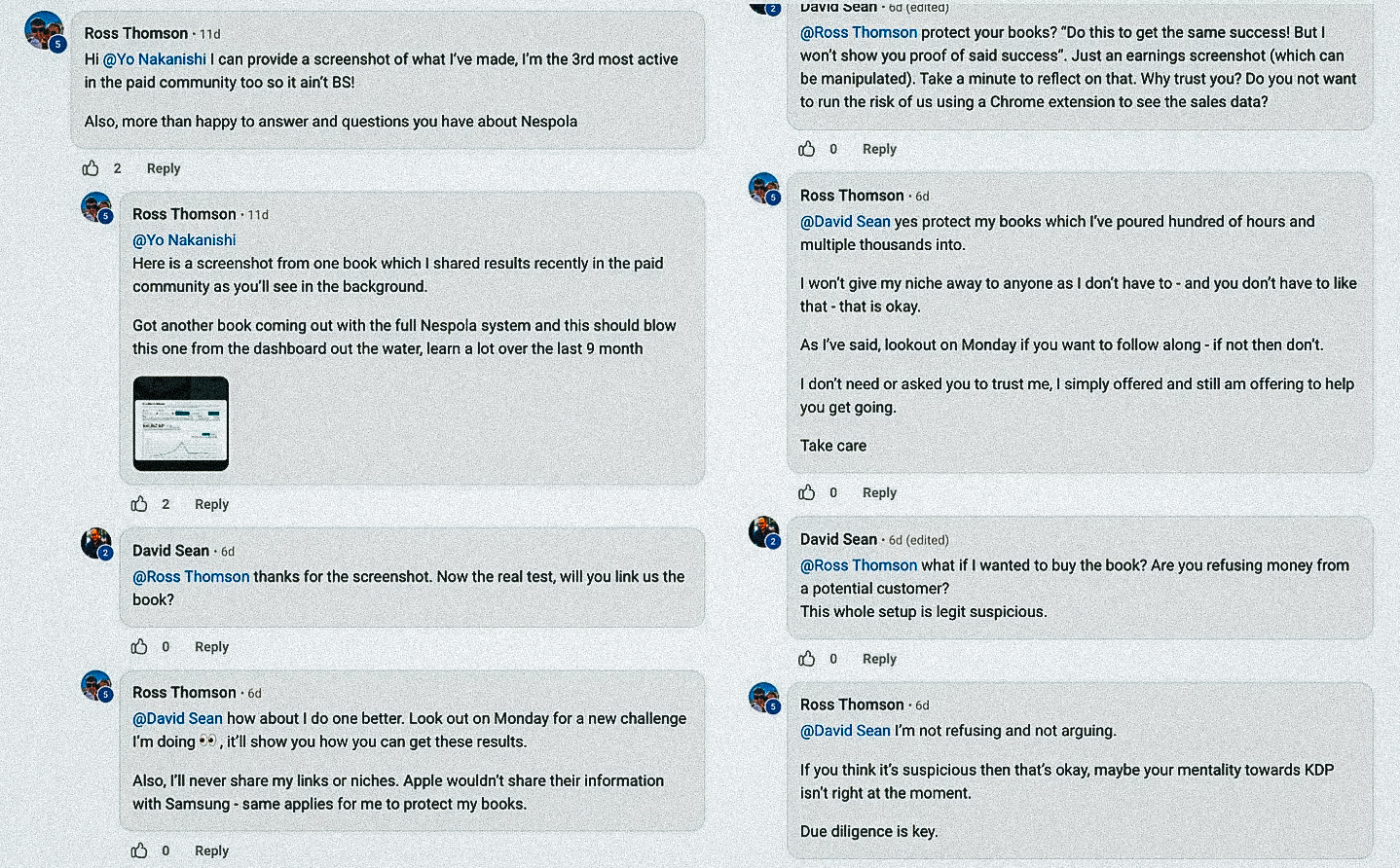
Inside the community, there’s tension. In one conversation, a skeptical user openly questions if anyone’s actually making money. Ross Thomson, claiming to be a successful student, gets defensive when (lightly!) challenged, insisting he has screenshots to prove success but refusing to share details. A user named David Sean jumps in and says it’s suspicious, asking “Are you refusing money from a potential customer?”
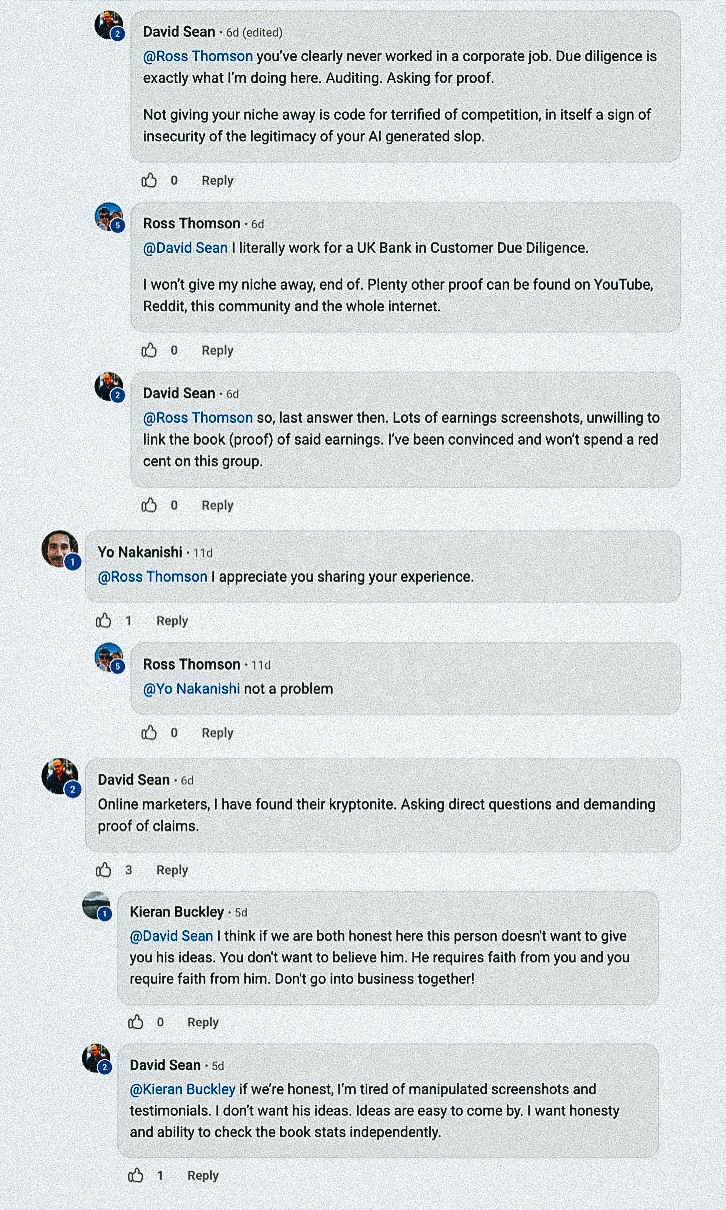
Outside of Ross Thomson from Edinburgh, many of the users don’t seem real at all. Greier Stephanie’s profile picture belongs to someone named Melanie Duford on LinkedIn. Faye Justis’s picture is actually a woman named Denise Carter. When I tracked down actual members, either they’d made very little money (low hundreds) or had “just started their journey” (hadn’t made any money at all).